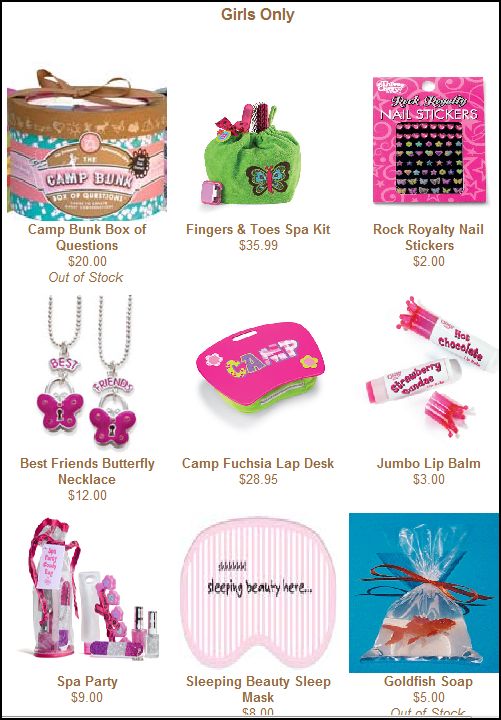The start of the Fall semester has inspired me to re-post this fascinating phenomenon we covered last year.
—————————
Rigby B. sent a link to the Just4Camp website to show us how care package products were gendered for “only” girls and boys. And, indeed, they were (screen shots below). But what is even more fascinating to me about this is the commodification of care.
The term “commodification” refers to the process by which something done for free becomes something done for money. Ever since the institutionalization of the wage, more and more things have become commodified. One particularly interesting category is care or what sociologists like to call “care work.”
Care work includes all of those tasks that involve nurturing and maintaining others: nursing, parenting, teaching, tending a home, etc. At one time in history, none of these things were paid jobs, but we have increasingly commodified them so that now paid nurses staff hospitals, home care workers take care of ailing elders, children spend the day in day care, professional teachers educate them, and housecleaners and gardeners can be paid to tend our homes and yards.
The care package is an example of care work. I still remember getting care packages in college with my favorite home made cookies and other things my parents thought I would like or needed. They take a lot of effort: thoughtfulness, shopping, baking, packaging, and mailing. And, here, we have an example of the commodification of that effort. The “care” in “care package” has been, well, outsourced.
Gendered care package ingredients:
For more on commodification, peruse our tag by that name.
Lisa Wade, PhD is an Associate Professor at Tulane University. She is the author of American Hookup, a book about college sexual culture; a textbook about gender; and a forthcoming introductory text: Terrible Magnificent Sociology. You can follow her on Twitter and Instagram.



Comments 55
Sarah — June 7, 2010
Ahh, nothing shows you that your parents care like a box of cheaply-made crap they picked online 5 minutes before a meeting!
Sadly, I'm sure the kids at camp are comparing their boxes of cheaply-made crap to see who got the most crap in a box. Commodification is a short hop over to competition.
Deaf Indian Muslim Anarchist — June 7, 2010
as a young 12 years old tomboy who was sometimes girly and would wear dresses on some days, I would have liked to get BOTH care packages... !!
Alyssa — June 7, 2010
This is ridiculous. As a kid I had the exact same pitch n' catch set that's in the "Boys Only" section. I would not have thought that velcro discs and tennis balls were reserved for Children with Penises Only (since trans and genderqueer kids don't exist in this universe). I guess I should have been playing with my Fingers and Toes Spa Kit and Rock Royalty Nail Stickers instead.
Bagelsan — June 7, 2010
I can't feel that bad about commodifying "domestic" sorts of things like this -- I think everyone knows who was doing the lion's share of the shopping and baking before it was outsource-able. Products that free up women's time are at the very least a gray area for me, and never all bad*, even if I personally much prefer getting hand-picked/made care packages and gifts.
*not that I think the OP was arguing this
Shae — June 7, 2010
That package of girls' stuff sucks. Eight of nine boys' items (as far as I can tell?) are games. Kids of all genders like to play games!
Of the girls' kit, ONE out of nine items are games. Seven appear to be things you stick on yourself, perhaps to look pretty. And then there's the lap desk, which at least implies something you can do something with.
fuzzy — June 7, 2010
I am not sure you can compare nursing at home---mopping up, cold/hot drinks, blankets---to the nursing care one receives in a hospital. I do a whole hell of a lot more than hold your hand and take your temperature.......not to downgrade laypeople assisting at home at all, but it isn't anywhere near the same thing!
Ames — June 7, 2010
I've seen a lot of infuriating things on this blog, but this one may win a "worst of..." award. Boys ONLY?? - WTF? Beauty products for girls who are at camp (presumably to be active? outdoors? self-reliant?) so they are sure not to get too far from society's beauty compliance standards.
What year is this? I seem to have gotten lost somewhere between the 70s, when girls and women were asserting that they could do and be anything and 40 years later, when it appears the only thing they should be focusing on is how they look. As they say in some parts of the internet, I Blame The Patriarchy.
Elizabeth — June 7, 2010
Because even at summer camp girls are still required to be beautiful passive objects.
Also, note that the boy gets the item to collect the dirty things while the girl gets the cleaning product. Since they are obviously not allowed to play any games, what are they supposed to be cleaning off?
Jodie — June 7, 2010
Wow, I'd have HATED the "girls only" care package. Gag.
My best friend and I would not only go to camp together, but we'd write letters to each other ahead of time and our parents would put them in the mail on the days we specified...we planned it out so each of us got at least one letter every single day. I still have those and treasure them -- how many kids are even going to remember that they got this crap?
When my own kids went to camp, I got blank postcards, stamped them, and handed them out to all their relatives (grandparents, aunts, uncles, cousins)...my kids still have all those as well.
Nectarine — June 7, 2010
Not only would I have hated to recieve that "girls" care package at camp, it likely would have been confiscated. All that scented/smelly spa stuff and lip balm? It's only going to attract bugs and other camp critters!
Travis — June 7, 2010
Wow, those look totally craptacular. For $35!?
Love how boys get games and stuff to play with and girls just get makeup and soap. Fun.
Melanie — June 7, 2010
Pink, pink, PINK! Why does "girl" stuff ALWAYS HAVE TO BE PINK!
Defrost Indoors — June 7, 2010
This reminds me of similar toiletry packs which start appearing in the stores each August and are geared for students. They'll have things like shampoo, shaving cream, maybe a small sample of candy, antiperspirant, etc. One difference I found when I bought a women's pack for myself: it contained a sample of Slim-Fast. (Dunno what the men's had; perhaps a pack of gum) How's that for a clear message?!
queenstuss — June 8, 2010
I notice a laundry bag in the boy's section, but the laundry powder seems to be missing from the girls section...
Chenoa — June 9, 2010
I worked at a girl's camp last summer, and I'm pretty sure the counselors who actually lived with the girls had to FIGHT to get some of those girls to shower. I'm sure the soap-'n'-shit would've gone over great! (Riiiiight...)
Jay Livingston — June 11, 2010
"Care package" to refer to the stuff parents send their kids at camp -- how many readers (or writers) of this blog are aware that this phrase was an ironic borrowing of the trademarked term "CARE Package"? The Cooperative for American Remittances to Europe provided food relief to post-War Europe, so you were ironically equating your kid at Camp Grenada with people near starvation in Yugoslavia. But I suspect that the phrase has lost that irony.
Laura — June 12, 2010
Nail stickers? Spa kit? Camping?!
As anyone who has ever been camping will know, 'beauty' and camping do not mix. It's hard enough keeping your hair clean, let alone sticking things on your nails. All the lip balm and stuff would be full of ants...urgh. I think it's best for anyone to abandon makeup when camping.
Sarah — September 7, 2011
Sociological implications aside, I never received care packages, at camp or at college. I feel I've been stiffed! :P
But egads, firstly, the commodification bit takes all the care out of the package - and the gendering makes me cranky, as I'd much rather have that puffer ball than goldfish soap, and EVERYONE needs a sleep mask when sharing a room with someone else. Or did I miss the new scientific discovery that only girls need sleep?
AsdfW — September 7, 2011
Because OF COURSE every girl in the world wants everything to be freaking pink. Ugh. CARE packages for camp and college actually used to mean your parents CARED enough to send something personal, not just purchased crap.
Umlud — September 7, 2011
Isn't part of the point of going to "camp" to get you away from your conventional life for a little bit? I know, I know, not receiving a "care package" could set you up as a social pariah. However, getting "care packages" from home always seemed to be an intrusion to me, and even in undergrad, I couldn't understand why some people -- whose parents lived only a couple of hours away -- wanted their parents to send them something.
Yes, I know that people like to know that they are loved and missed, but seriously, I think that as good of a discussion could be merited about the need for "care packages" in the first place for what is -- let's face it -- a relatively short stint away from "home", during which time you are presumably supposed to be busy doing stuff.
... but who knows: I've always been more independent than many of my peers.
Larrycharleswilson — September 7, 2011
Education was commodified a very long time ago. Teachers in Ancient Greece and Rome were paid for their efforts.
Ms. Sunlight — September 7, 2011
It's always seemed to me that the whole concept of Summer Camp comes from a position of wealth and privilege. When you can afford to pay someone else to care for your children for weeks at a time so you don't have to, what is a little more commodification?
Kate — September 8, 2011
Notice how the two *least* gender specific items for girls are "Out of Stock" : the goldfish soap and bunk questions. Perhaps consumers agree that girls don't want to paint their nails and have a spa at camp....after all, it's CAMP, right?
Ggp10bc — September 9, 2011
Is this a generally American thing? Whilst my mum always sends me socks in the winter (bless her), I've never heard the term 'care package'? Interestingly, (or not) it may not as as 'institutonalised' and therefore less commodifiable as a 'product' in the UK due to the different nature of going to uni (as I understand this thing happens at colleges?) due to home only ever being an hour or two in the car/train.
Anonymous — September 9, 2011
It might be better to reinforce that there is no moral judgement implied with the statement "more and more things have become commodified".
It's an inevitable result of increased specialization: One full-time gardener can do more gardening in 48 hours a week than 6 hobbyist gardeners can in 8 hours each; through the magic of currency, the value of the improved overall production can be distributed among everyone.
eeka — September 10, 2011
Yeah, was thinking along these same lines that much of this stuff is usually on the lists of things that camps ask you NOT to bring -- toys, makeup, jewelry, etc. The puzzler books seem appropriate enough.
Katie — September 11, 2011
they do love pink that's all